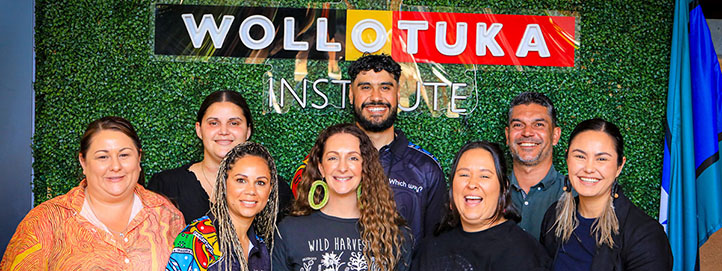
Research
Aboriginal and Torres Strait Islander research at the University of Newcastle is primarily centered through the Wollotuka Institute, Purai Global Indigenous History Centre, and the Thurru Indigenous Health Unit. These research hubs prioritise the inclusion of Aboriginal and Torres Strait Islander perspectives, knowledge systems, and methodologies, ensuring that research is not only led by our voices but also grounded in cultural protocols and community engagement.

Key strategies
Become a research student
Higher Degree Research (HDR) programs are either a Doctor of Philosophy (PhD) or Master of Philosophy (MPhil) degree.
All HDR programs involve a supervised research project that demonstrates the candidate’s ability to make a contribution to knowledge in a particular field of study. The University has over 150 HDR programs to choose from.
Supporting Aboriginal and Torres Strait Islander Higher Degree Research (HDR) students and expanding the Aboriginal and Torres Strait Islander academic workforce are priorities for us. The team assists in providing appropriate resources for strong outcomes for HDRs researching through Wollotuka and the wider university. We have a sound understanding of the cultural factors that influence HDR candidature and are dedicated to ensuring a culturally safe environment for research students.
For enquiries, please contact the Wollotuka Research Support Team at Wollotuka-HDR@newcastle.edu.au
Find out more Join us as a reseacher or academic
‘Research Our Way’ – Aboriginal Health Research Strategy
The University has launched a strategy for Aboriginal and Torres Strait Islander Health Research for the Hunter, New England and Central Coast Regions. The strategy will provide a vehicle to empower local Aboriginal and Torres Strait Islander communities to lead and participate in Health Research.
Culturally responsive evaluations
The University has committed to expanding expertise in culturally responsive evaluations, reflecting the increasing recognition of the need for inclusive and equitable evaluation practices and utilisation of Indigenous methodologies. Culturally responsive evaluations are an important aspect of ensuring that research, assessment, and evaluation processes respect and reflect the values and experiences of Aboriginal and Torres Strait Islander communities.
University educators Nathan Towney, Monica McKenzie and James Ladwig led the evaluation of the NSW government’s Connected Communities strategy.
Incorporating principles from Re-imagining evaluation: A culturally responsive evaluation framework (a document co-authored by teams from the NSW Department of Education and the University of Newcastle), the evaluation explored the views, experiences and insights of people in diverse school communities with a focus on incorporating the voices of Aboriginal and/or Torres Strait Islander peoples.
For enquiries, please contact the Culturally Responsive Evaluations Team at PVCindigenous@newcastle.edu.au
The University of Newcastle acknowledges the traditional custodians of the lands within our footprint areas: Awabakal, Darkinjung, Biripai, Worimi, Wonnarua, and Eora Nations. We also pay respect to the wisdom of our Elders past and present.